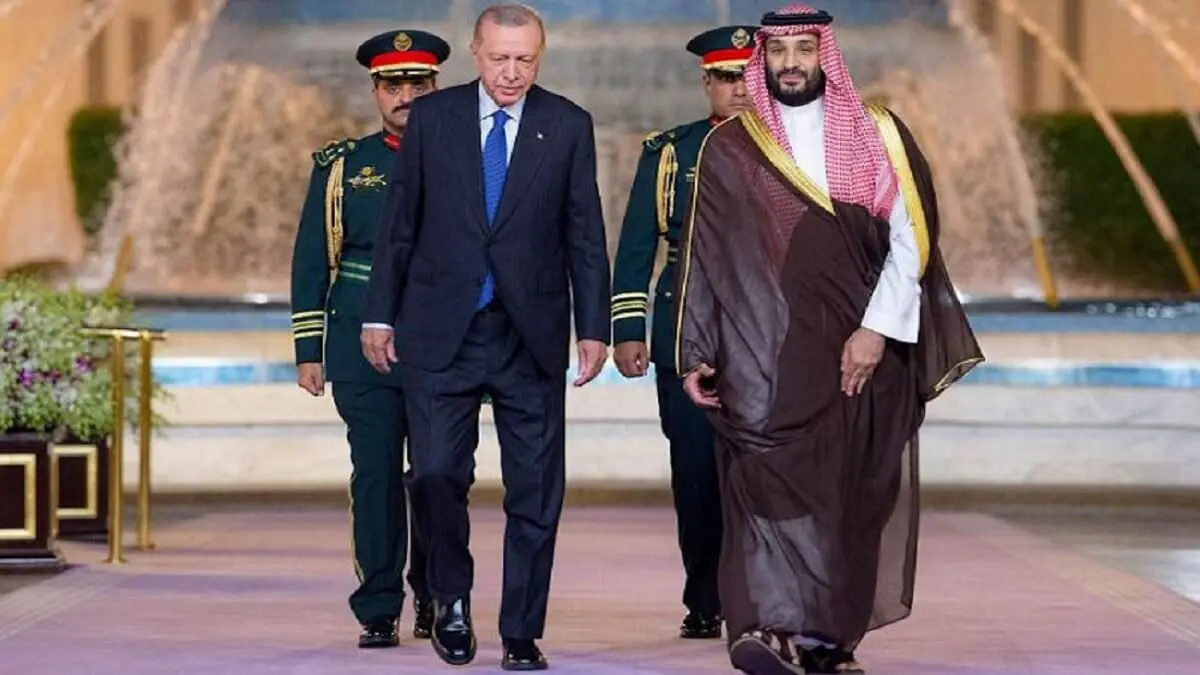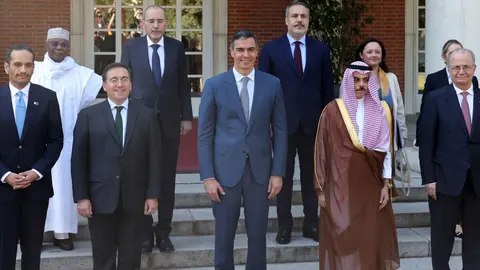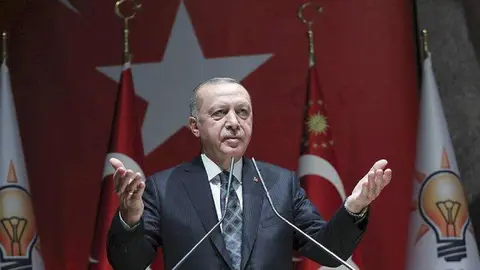The new Erdogan is more useful for the region

An economically strong, politically calm country in harmony with rest of the region is the Turkey which the Middle East needs in the face of Iranian arrogance, Israeli crimes and Western indifference.
With a rational Turkey, the region can work, coordinate actions and invest.
Despite all its tragedies, regional fallouts and potential impact, the Gaza war has come at the right time for Turkish President Recep Tayyip Erdogan.
The grand Turkish adventure aimed at restoring the former glories of the Ottoman Empire, launched by Erdogan nearly a quarter of a century ago, has reached its logical conclusion. Turkey has stood by and watched the events that followed the “Al-Aqsa Flood” unfold without a significant reaction, except for its condemnation of Israel’s war of retaliation against all things Palestinian.
The assault caused the destruction of Gaza, killed tens of thousands of Palestinians and injured and displaced hundreds of thousands more. In its reactions to the Israeli onslaught, Turkey was no different from many countries. In some instances, other capitals have in fact gone further than Ankara by severing diplomatic ties with Israel. After long months of war and destruction, Turkey announced a partial trade boycott halting commercial transactions with the Jewish state. But all political and military coordination between Turkey and Israel has remained in place.
Erdogan has in the past used the Palestinian issue as a point of entry to encroach on the region. There is no need to point out the role played by the Syrian regime in rehabilitating Turkey and burnishing its regional reputation. In a moment of great delusion, the secular Baathist Bashar al-Assad was convinced that the political Islam umbrella organization could serve his regional plans. Qataris played a major role in this regard as Assad chose for allies the Palestinian militant group Hamas (and the rest of the Muslim Brotherhood, including the group’s Syrian branch as represented by its guide Sadr al-Din al-Bayanouni), Hezbollah, along with Iran, and the rising neo-Ottoman ambitions of Turkey as fueled by the Muslim Brotherhood-based Erdogan project.
The welcome and attention whetted the appetite of the new “Sultan” as his star rose in the region. As a result of the situation created by the US occupation of Iraq, the stark choice was between Turkey and Iran. The region evolved into an arena for wide regional confrontation after the “Arab spring” as Turkish influence widened. Attempts at appeasement, especially through moves by Arab Gulf states, offering contracts and investments in order to change Erdogan’s policies, proved to be in vain.
The conflict between the axis of Arab moderation and the Turkish-Qatari-Brotherhood project became a daily driver of the region’s politics, while the moderates made a concerted effort to confront Muslim Brotherhood ambitions and dealt them a fatal blow in Egypt.
Erdogan chose to widen the scope of the showdown by expanding the Turkish military footprint from Syria and Iraq to the raging war in Libya. He moved on to defeat General Khalifa Haftar’s drive to unify Libya’s eastern and western regions. Views differ on whether Erdogan’s goal in Libya was to extend support to the Libyan Muslim Brotherhood-aligned forces or to besiege Egypt from its western flank.
Erdogan ratcheted up his hostility to the UAE and Saudi Arabia beyond limits, as he used the murder of Saudi journalist Jamal Khashoggi to defame Saudi Arabia and its leadership. One of the ironies of Ankara’s anti-Saudi campaign is that while it indulged a great deal in blaming Riyadh for its attempt to kidnap or assassinate Khashoggi, Turkish intelligence was carrying out one of its largest kidnapping and liquidation operations ever against the country’s opposition. The Saudis sent two planes to kidnap Khashoggi and return him home, dead or alive, while hundreds of private Turkish planes were being flown to Asia, Europe and Africa with the purpose of bringing back Turkish supporters of Erdogan’s former ally, Fethullah Gulen. At the same time, Turkish intelligence operatives were active in northern Iraq and Syria, carrying out liquidations of prominent Kurdish leaders.
Eventually, many factors worked against Erdogan’s grand adventure. Perhaps one of them was his lack of understanding of economic realities as they involved borrowing, toying with interest rates, and the invention of new economic theories that disregarded John Maynard Keynes logic of the state’s regulation of the economy and its control of interest rates. Beside his political overreach driven by an improvised neo-Ottoman notion in pursuit of Muslim-Brotherhood objectives and Turkish self-interest, Erdogan entrusted his inept brother-in law Berat Albayrak with the economy. Albayrak’s tinkering with the financial system brought the country to the brink of bankruptcy.
Turkey, a nation of past historical grandeur, has sent successive warning signals to its president. It was painful for the world to see an important successful economic experiment being sunk by ideological motives and illusions. Erdogan interpreted Arab goodwill towards Turkey as a license to restore the country’s imperial past. There is no doubt that Turkey enjoyed a privileged position in the region as there was no comparing its standing in the Middle East and North Africa with that of Iran. Even psychologically, the Turks are in a different league to Tehran. They are driven by the logic of restoring the glory of the Ottoman Empire, while Iran’s logic is essentially driven by its craving for revenge for its historical defeat during the Muslim conquest which put an end to the Persian Empire. Of course, it is possible to explain the different standing between the two countries by emphasizing the sectarian contrast between Sunni Turkey and Shia Iran.
At one time however, Turkey, under Erdogan’s leadership, began to behave in a similar way to Iran. There was only a difference in the tools used to fulfil each country’s ambitions. The Muslim Brotherhood and Hamas of Turkey played a similar role to that played by affiliated militias and Hezbollah for Iran. Hamas was also a common denominator between the two.
Confronted to the Gulf reconciliation at the Al-Ula Summit in Saudi Arabia and the great economic pressures his country faced, Erdogan realised that the adventure was coming to an end and that it was wiser to cut his losses and move on.
Any fair observer will conclude that the policy of the extended hand, first from the UAE and then from Saudi Arabia, had the greatest impact in reconciling the region’s countries with Turkey. These countries received Erdogan with a willingness to let bygones be bygones.
In recent months, Emirati and Saudi investments have begun to flow into Turkey. The world picked up on signals indicating a “changed Erdogan” and interpreted them favourably. The Turkish economy returned to abiding by the basics of the global economy. Gulf and international investments reflected trust and support for Turkey’s good behaviour. A few days ago, for example, a Citibank report signalled large investment flows to Turkey that could help put the Turkish economy back on the right track. Such an assessment would not have been possible had Citibank not understood what it meant for the largest bank in the region, First Abu Dhabi Bank, to come forward and offer approximately $8 billion to buy majority shares in the Turkish Yapi Kredi Bank. The rift that kept foreign investors away from Turkey for ten years is about to end.
Now, what is Gaza’s connection to the economic situation in Turkey? The “old” Erdogan would not have missed the opportunity of the catastrophic war crisis in Gaza to seek to reap maximum political advantage, whether by trying to intervene or by heaping blame on Arab countries for not intervening directly in the crisis. He would have sought to regain the adventurist mantle which drove him in 2010 to try to “break” the siege of Gaza with the so-called “Freedom Flotilla” and its “Mavi Marmara” ship. There is no comparison between the Israeli siege of Gaza in 2010 and the magnitude of what is happening today. Now the Palestinians scour Gaza’s horizon and do not see “the Marmara” nor any other “Freedom Flotilla” ships. All they see is an American pier from which they wait for relief. The era of Erdogan’s hyperbole has passed, and perhaps will never return. The neo-Erdogan, who deals so calmly with an issue which was once his daily fixation, is a different Erdogan.
An economically strong, politically calm country in harmony with the rest of the region is the Turkey which the Middle East needs in the face of Iranian arrogance, Israeli crimes and Western indifference. With a rational Turkey, the region can work, coordinate actions and invest.
Dr Haitham El-Zobaidi is the executive editor of Al Arab Publishing Group.



